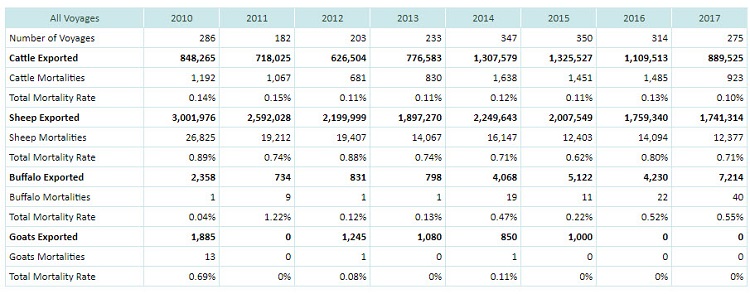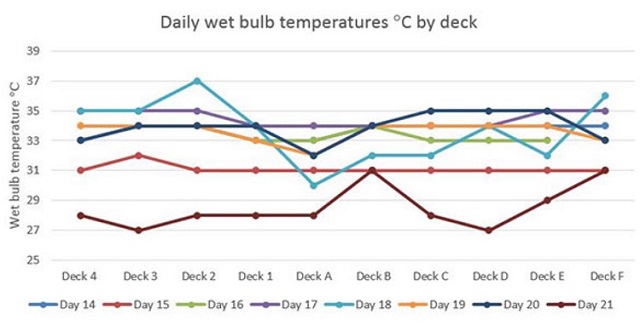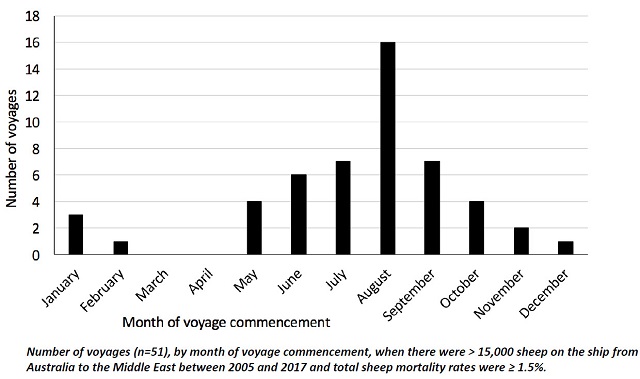More Live Export Footage, This Time from Industry
Australian Liberal National Party Member of Parliament Keith Pitt didn't discuss stocking density during his tour of a docked live export ship last week, but he did feel that what he saw gave him confidence in the future of the industry.
Pitt wanted to take part in the industry-led tour because around five hundred people in his electorate voiced their concerns to him about animal welfare on livestock carriers after whistleblower footage was released on 60 Minutes in April 2018. He says that he saw some of the footage himself, and it was horrifying.
His view of the tour was that the people involved clearly care about the welfare of their animals, and, regarding stocking density, that the sheep looked comfortable. “They're a herd animal. I take experts' advice, and the two veterinarians that we had there were very, very knowledgeable,” he said.
“The animals are well looked after. There's an animal hospital. Their losses are typically very, very low. I was very impressed.”

Courtesy of the Australian Department of Agriculture.
However, high-mortality voyages have plagued the industry for decades, as have whistleblowers, and more footage: “Boiled Alive,” deemed so confronting and horrific that commercial television would not show it, was aired by Fairfax Media shortly after the 60 Minutes program.
It is election-year in Australia, and the Australian Labor party, currently in opposition, has backed calls to phase out the live export industry as a result of the public outcry after the footage was released last year.
Central to the debate is heat stress and stocking density, particularly for sheep sent from Australia's winter to the Middle East summer, a voyage of several weeks undertaken in the lead up to the annual Muslim Festival of Sacrifice.
A key focus of the whistleblower footage was a voyage for Emanuel Exports. The company loaded a consignment of 63,804 sheep and 50 cattle on to the Awassi Express, destined for Qatar, Kuwait and the UAE in August. A mortality rate of 3.76 percent (2,400 sheep) was recorded. All decks were fully enclosed and all were loaded in accordance with Australian standards and recommendations current at the time, according to a subsequent government investigation into the voyage. The onboard veterinarian reported that decks that were less densely stocked “held up better,” possibly due to less respiration and urine contributing to the humidity.
When high heat and humidity started to affect the sheep, individual animals identified as heat affected or bogged in excrement were removed into alleyways near ventilators. Livestock were further spread out across the vessel as more space became available following discharge at each port. These actions however, were insufficient to prevent the high mortality rate experienced.

Courtesy of the government report into the high mortality voyage of the Awassi Express.
“The research on this topic has been round a long time,” says Dr. Sue Foster of Vets Against Live Export. “And that research was solid. The footage from Fazal Ullah that was shown on 60 Minutes merely gave us a visual in-situ documentation to confirm that the experimental data was indeed accurate and, a best case scenario.”
“Having done 57 voyages to and through the Middle East, nothing in the Awassi Express footage surprised me, it showed an all too common issue with the trade which is the cruelty of heat stress,” said former live export veterinarian Dr. Lynn Simpson. “The Awassi Express footage was unfortunately another example of unacceptable, business as usual, in a Middle Eastern summer voyage.”
Simpson was hired by the Department of Agriculture in 2012 after Four Corners revealed images of animal suffering on a live export ship. She produced a report that included images of sick and injured animals that she had taken whilst employed in the industry. The images were used as part of her role in training veterinarians new to the trade, as they showed conditions that veterinarians would typically encounter on a voyage. The report was meant to be confidential, but it was published on the department's website, and Simpson was removed from her role and has not been offered work by a live export company since.
“In my experience, I have certainly seen sheep in the same level of heat distress as that shown on the Awassi Express videos in the 60 Minutes expose last year,” says Simpson. “I don't believe there was a ventilation failure for that footage, as when I have been on single tier sheep ships that have had ventilation failures it often coincides with a complete blackout of lighting as well, and animals are often so desperate that they try to physically jump out of the pens due to the sudden change in oxygen supply. The sheep on the Awassi Express footage appeared to be conditioned to the poor conditions in the video and were not behaving as if there was a sudden change.”
Animal welfare organizations have continued to call for an end to the live export trade. The Australian Veterinary Association recommended an end to live sheep exports to the Middle East between May and October, saying that there is no way to eliminate the risk of sheep dying from or suffering heat stress during those months. The live export industry has voluntarily stopped shipping sheep from Australia to the Middle East from June to August, pending developments that could reduce heat stress.

Courtesy of the Australian Veterinary Association.
Pitt believes that if animal welfare standards are met, the multi-million dollar live export industry should continue. “They're an important trade for Australia, and in terms of our reputation, people want our products, because they're clean, green and safe,” he said “If we are not in the market, that market space will be filled by others who don't have our animal welfare standards. So I just don't see how this [a ban on the trade] is in the interests of anyone, including the animals.”
Pitt was joined on his tour of the Al Messilah by around 30 other politicians, as part of a transparency drive by Emanuel Exports. The company has had its export license canceled, so, accompanied by accredited veterinarian Dr. Holly Ludeman, the politicians viewed the loading of sheep for another exporter. Emanuel Exports recently employed Ludeman as a new Corporate Governance and Compliance Officer. She has worked in the industry full-time since 2013.
In inviting politicians to attend, Ludeman released video footage from a voyage she undertook in December/January this year - from Australia's summer to the Middle East winter. “The Awassi Express footage was appalling to everyone in the industry,” said Ludeman. “It made me more determined to demonstrate the reality I had previously seen as an Australian Accredited Veterinarian, but I needed to see the supply chain for myself before I could continue to accept this role,” she said. “RETWA and KLTT opened their doors and allowed me to review, film and interview all sectors to show the real story. Good news doesn’t sell newspapers, but this is a story I’m proud to be part of.”

that matters most
Get the latest maritime news delivered to your inbox daily.
Emanuel Exports remains committed to the live export industry after 50 years of helping establish and lead the trade. “The images we saw [from the Awassi Express] were not acceptable to anyone and will not be part of the future of this industry. We have reached a new era where transparency and technology will be the new normal. I look forward to working with producers, the regulator and community alike helping industry achieve this,” said Managing Director Nicholas Daws.
The Australian government has also committed to greater transparency and continuing the live export trade but has yet to release publicly video footage taken by inspectors it has placed on voyages to the Middle East since the 60 Minutes program was aired.
